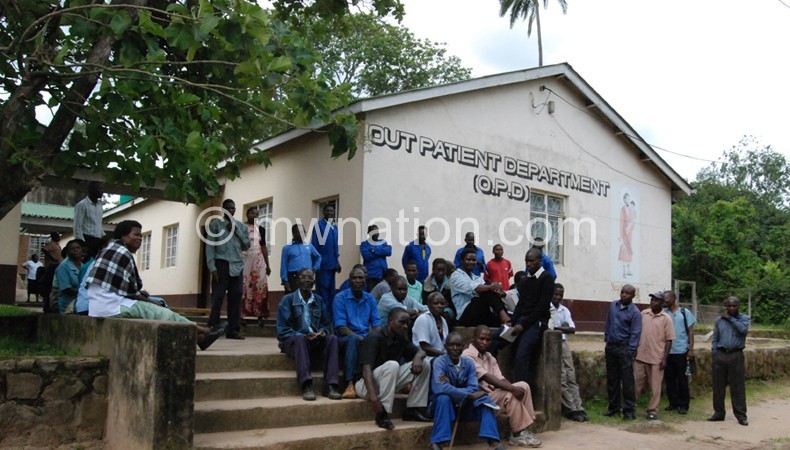Cham hospitals’ staff down tools
There were mixed scenes yesterday when aggrieved employees of Christian Health Association of Malawi (Cham) started their strike with about half of the health facilities discontinuing their operations nationwide.
Spot checks at some Cham facilities in Blantyre and other districts showed that while some personnel stayed away from work and were seen playing assorted games within their workplaces, it was business as usual at some health facilities.

A full-blown strike could cripple a huge chunk of healthcare service delivery in Malawi, 37 percent of which is controlled by Cham. Of this percentage, 90 percent are in rural and hard-to-reach areas.
The workers had given government a seven-day ultimatum to address their salary increment disparities or they would down tools indefinitely since yesterday.
Organisers of the strike confirmed the low patronage, but attributed it to failure to effectively reach out to all the 140-plus Cham facilities, particularly those in rural areas.
The confusion was also heightened after some Cham executives, alongside the National Organisations of Nurses and Midwives of Malawi (Nonm) and the Malawi Congress of Trade Unions (MCTU), said no member of Nonm would join the strike because discussions with government were still in progress.
Cham Workers Task Force secretary (Southern Region) James Chiswe admitted in an interview yesterday that the strike started on a low note due to poor communication, but picked up as the day progressed.
He said: “We are in touch with our colleagues across the country and the picture is that the strike is progressing, though on a slow note, primarily due to lack of communication.”
A visit by The Nation to one of the Cham hospitals, St Joseph Mission Hospital in Chiradzulu, popularly known as Nguludi, revealed that the facility was still operating though on a small scale while majority of the workforce were just loitering around the campus, mainly outside the outpatient department.
A team of other nurses and clinicians was seen attending to other patients in different wards like the casualty.
Task force chairperson for the North and Centre Chimwemwe Tebulo and Yona Chisepeya respectively also indicated that the strike started slowly, but garnered momentum later in the day.
“Some started early morning while others joined later. We also have others like Ekwendeni Mission Hospital who will join tomorrow. So, right now I can say roughly about 50 percent of the workers in the Northern Region have joined the stay-away, but we expect the number to swell tomorrow morning,” said Tebulo.
Minister of Health Jean Kalilani said in an interview government advised the disgruntled workers on Wednesday to follow proper channels to get information on the matter, but ignored it and decided to proceed with the strike.
“We are just surprised with their action, so it is up to them to come and we proceed with the discussions or they proceed with the strike. Otherwise, we cannot tell you everything because some information is not for public consumption,” she said.
The workers who, according to statistics, constitute about 40 percent of the country’s health workforce, is also asking governing to stop taxing their leave grants as it did with the civil servants.
In Nsanje, Malawi News Agency (Mana) also reported that workers at Trinity Mission Health Centre, a Cham facility, also joined the strike to force government to pay their arrears in line with new salaries that were effected in October last year.
Mana quoted the hospital’s chief anaesthetist Mayesero Chawuwa as having said: “Our patience has worn out. We had a meeting on February 2 where it was agreed that our concerns would be addressed by March 4, but to no avail. Therefore, we have resorted to downing tools to force government to pay our salary arrears in line with the new salaries government introduced in October last year.”
According to a Memorandum of Understanding between Cham and the Malawi Government, the latter is responsible for a fraction of the former’s workers’ salaries.
FAST FACTs
l Second largest healthcare provider in Malawi
l Established in 1966 and has been working with government for the past 40 years
l Contributes to 37% of healthcare service delivery
l 90% of the facilities are in rural and hard-to-reach areas





